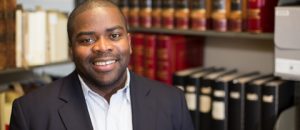
by Jessica Purkis
Recently, I had the chance to catch up with Bergis Jules, the University and Political Papers Archivist at the University of California, Riverside. Bergis manages UC Riverside’s institutional records, political papers collections, and African American collections. While supporting the university’s administration and community outreach efforts, Bergis documents campus history and builds collections around local, regional, and state political organizations in California. As part of his work, he is constantly reaching out and educating to build better donor relations and more diverse collections.
Bergis views his work in archives as a way to build ties between communities and ties between community members. He believes that archives and cultural heritage materials can bring people together, especially when those materials are “put into the hands of those who teach.” Without enhanced accessibility, some users might never encounter these materials (or communities) at all. To build ties, outreach and advocacy are essential. By creating a space for conversation, an archivist can build trust and discover a community’s particular needs. The most important aspect of any outreach or advocacy project, Bergis reminds me, is “putting people and communities first.” No matter the medium, digital or old-fashioned face-to-face, conversation comes first. Bergis believes that collaborating and conversing with smaller communities holding diverse materials is the best form of advocacy that an archivist can perform at a large repository. The best way to do this, he adds, is to learn to listen to the communities that keep the materials.
Because listening facilitates collaboration, Bergis suggests that listening itself is a great way to find new strategies for outreach and advocacy. An archivist can learn a lot from other projects by asking about what has worked and what hasn’t, and then seeing what spaces may be left behind that provide new project ideas. Bergis has had a lot of success learning about new projects through networks of archivists on Twitter. According to Bergis, following the networks on Twitter is a really effective way to find out about and collaborate on all kinds of projects, including grassroots archiving. Bergis himself is very active on Twitter, and can be found at @BergisJules.
In the past, Bergis has helped build collaborative communities around collections from underrepresented groups. He has worked at the Black Metropolis Research Consortium at the University of Chicago and also at the District of Columbia Africana Archives Project at George Washington University. At the BMRC, he was Project Director, and helped create a digital repository of collections documenting Chicago-area African American and African diasporic materials. Bergis wrote a grant to jumpstart the DC Africana Archives Project, increasing access to collections documenting the history of the African diaspora in the DC area. Both projects have been incredibly successful in enhancing accessibility to materials. More recently, Bergis has helped develop Documenting the Now, a tool for archiving tweets, to help document diverse perspectives on social justice issues.

Bergis therefore brings a long-standing commitment to community-building and diversity to his work at UC Riverside’s Archives, located in the UC Riverside Library. The library holds more than 275 manuscript collections, including personal, family, and organizational records. The university collects materials that document a wide variety of experiences in the US, particularly in the Inland Empire Region, an area in inland southern California east of Los Angeles. Some of the strengths of Riverside’s special collections lie in the history and culture of the Inland Empire region, Latin American history and culture, and ethnic studies, which document African American, Native American, Asian American, and Chicano/Latino experience.
UC Riverside currently spearheads the Inland Empire Memories consortium, a group of cultural heritage institutions located in the Inland Empire. Bergis is the Project Coordinator there. He writes grants and manages the program day-to-day in conjunction with the other member institutions. Because the consortium was established recently, right now Bergis spends much of his time listening to the consortium’s members, gathering data along the way about their projects and interests, their resources, and their ideas for later programs. Bergis is currently helping to facilitate the Sherman Indian High School Museum’s project to digitize some of its collections and provide its users with new levels of access.
In future, the Inland Empire Memories institutions intend to collaborate to share funding, develop access tools and programs for digital collections, and build relationships with other community institutions. The Inland Empire Memories mission is “to identify, preserve, interpret, and share the rich cultural legacies of the Inland Empire’s diverse communities” by enhancing access to cultural heritage materials. It emphasizes materials documenting “peoples and groups underrepresented in the historical record.” Increasing diversity in the archival record, I have come to find, is something of a theme in Bergis’ work.
It’s through listening that Bergis has had such success collaborating with others to promote access to a more diversified historical record. I expect that the Inland Empire Memories Consortium will become as active as the Black Metropolis Research Consortium and the DC Africana Archives Project in enhancing access to new materials. I hope to hear about many more projects from its members in the future!
